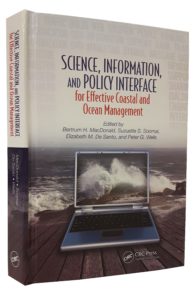 “The Science-Policy Interface in Coastal and Ocean Management” is a series of posts highlighting the chapters in the new book: Science, Information, and Policy Interface for Effective Coastal and Ocean Management, edited by Bertrum H. MacDonald, Suzuette S. Soomai, Elizabeth M. De Santo, and Peter G. Wells, published by CRC Press (Taylor & Francis).
“The Science-Policy Interface in Coastal and Ocean Management” is a series of posts highlighting the chapters in the new book: Science, Information, and Policy Interface for Effective Coastal and Ocean Management, edited by Bertrum H. MacDonald, Suzuette S. Soomai, Elizabeth M. De Santo, and Peter G. Wells, published by CRC Press (Taylor & Francis).
Positive transformations are happening in the Community of Practice for Coastal and Ocean Management in Atlantic Canada (CoPCOM)! The Atlantic Coastal Zone Information Steering Committee (ACZISC) is changing its brand from a “steering committee” (the original intention of its founders in 1992) to a “network” by adopting the moniker of Coastal and Ocean Information Network Atlantic (COINAtlantic) – a name that rolls a little more easily off the tongue. COINAtlantic has an organizational format that implies greater accessibility to its activities and is more consistent with the objective of supporting the diversity in the CoPCOM. COINAtlantic has also changed its method of holding meetings, and is now adopting a thematic workshop approach, which has been implemented in the three most recent meetings. In these three latest workshops – September 2015, focussing on aquaculture, May 2016 focussing on remote sensing technologies for coastal mapping, and October 2016 focussing on coastal climate change adaptation – the reach of COINAtlantic into the CoPCOM was expanded into industry, research, and municipal governments, respectively. These changes promise to increase the relevance of COINAtlantic’s work to the CoPCOM and increase its influence more broadly among the members of the CoPCOM.
Another transformation in the CoPCOM relates to the developments on the marine geospatial data infrastructure (MGDI), as presented in our chapter “impediments to institutional collaboration [for the MGDI] still remain.” Significant progress has thus far been made at both the provincial and federal levels. The Atlantic Canadian provincial governments are moving towards accepting open data policies and implementing well-supported internet services for delivering data and data services (e.g., GeoNova), while the Canadian federal government released a publicly accessible version of the Federal Geospatial Platform in 2016 using the Open Maps website. Additionally, the Marine Environmental Observation Prediction and Response Network (MEOPAR) has continued to facilitate the development of a Canadian CoP for ocean data management, and COINAtlantic is actively making marine species occurrence data more accessible with web mapping services as well as facilitating the deposition of this data in the Ocean Biogeographic Information System (OBIS). Even with all this exciting progress being made, the full realization of an MGDI is still in the future.
Information matters, but accessible and reliable information matters most. The policies and management decisions made for coastal and marine zones must have publicly accessible information in order to develop the social license for coastal and ocean development. For example, the recent report An Ocean of Opportunities: Aquaculture in Canada, from the Standing Senate Committee on Fisheries and Oceans states: “Public trust can also be improved by government openly providing information about the aquaculture industry and disclosing the industry’s environmental performance data” and “information [on the current body of research that is easily assimilated by the public] will contribute to more informed discussions and debates on aquaculture and help everyone understand how the industry can continue to operate and grow sustainably into the future” (Standing Senate Committee on Fisheries and Oceans, 2016, p. 3, and 51, emphasis added). As custodians of data and information relevant to coastal and ocean decision making, we must continue to be encouraged to adopt policies and implement procedures to provide accessibility of reliable information to managers, other researchers, civil society, and the public at large. This was the mission of the ACZISC, and continues to be the mission of COINAtlantic.
The individual book chapters are available from the publisher’s website: Chapter 15
The full book is available in print and e-book formats from the publisher at this link
Reference
Standing Senate Committee on Fisheries and Oceans. (2016). Volume Three. An ocean of opportunities: Aquaculture in Canada. Ottawa: Senate of Canada.
Authors: Andrew G. Sherin and Alexi Baccardax Westcott